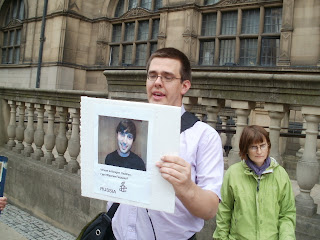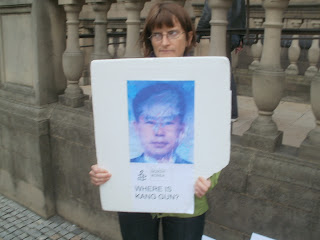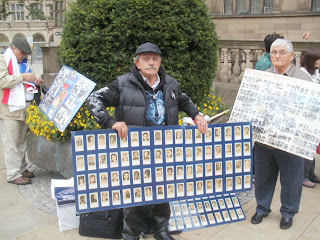ASSIST provides advice, support and friendship for destitute asylum seekers living in Sheffield. We're a team of ASSIST volunteers, friends of ASSIST, asylum seekers and refugees running 10km in the Great Yorkshire Run on Sunday October 9th 2011, and hoping to raise at least £500 to enable ASSIST to continue its crucial work.
Check this page for team training updates and photos leading up to the race, and for more info on ASSIST, please visit www.assistsheffield.org.uk/.
Thanks!!!!
The ASSIST Runners
http://www.justgiving.com/ASSIST-Runners
About ASSIST
Asylum Seeker Support Initiative – Short Term (ASSIST) is a Sheffield charity that helps destitute asylum seekers in and around Sheffield. Asylum seekers become destitute when all the support they have been receiving from government is withdrawn following a final negative decision on an asylum claim. We often hear that they are failed because they are not genuine, but researches in 2003 by a group of MPs found that over half of those refused were in fact genuine; a proportion thought to be even greater now due to lack of adquate legal help.
Refused asylum seekers are not allowed to work, to register themselves as homeless, or places in local authority night shelters. There is no legal way for them to support themselves. Many become destitute, struggling daily for food, accommodation and clothing. It is estimated that there is about 1000 destitute asylum seekers in the Sheffield area alone.
What help do we give?
- finding night shelter for those sleeping rough
- finding temporary accommodation with host families
- paying a small weekly grant for food and basic living expenses
- advising about other sources of assistance available (charitable and non-charitable)
- giving free bus pass vouchers to those with serious medical problems, and pregnant women who would find it difficult to walk
- giving free bicycles
- finding longer term solutions by assisting clients to pursue their asylum claims
- raising awareness to the problem through events and talks
- opportunities for volunteering
When necessary we provide people with money for travel expenses, so they can go to legal appointments. We are presently able to help about 25 people with accommodation, mostly hosted in private homes. ASSIST wants to help people in as dignified manner as is possible so they do not have to rely on food parcels.
Assist relies very much on the generosity of the public to meet the basic living needs of the asylum seekers. We have so far been able to help over 60 destitute asylum seekers with grants and accommodation. We try to give priority to those who suffer serious medical problems as well as women in late stages of pregnancy when making decisions about who should be helped. Those who can not be helped still benefit a lot from advice given by our volunteers about how they can access other forms of assistance.
What help can you give us?
You can make a big difference to the lives of these people by:- making a regular donation to Assist, cheque or bank transfer
- host an asylum seeker for a short period of time
- supporting Assist at many of its fundraising events
- raise awareness by inviting members of Assist to come to speak to you about the problem
- become a volunteer with Assist
Being a refused asylum seeker is one of the worst punishments on men. Everyday, we see doors shut which deny us access even to the most basic human needs. In an environment where everything appears to shift towards relentless firmness with no room for sympathy ASSIST really is a life saver. Their work targets solving real problems faced by asylum seekers: need for shelter, food, clothing, access to healthcare, advice and signposting, befriending, and above all listening and caring. It is not easy dealing with people for who the future has nothing -but ASSIST goes beyond and ask people to open their doors and take in asylum seekers. It is beyond words to describe such gestures and generosity. The worst feeling is knowing that you have nothing to offer in return; yet the relief is that nothing is expected of you in return.























